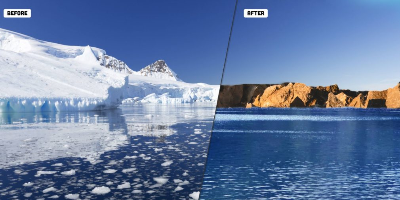5 déc. 2017 - How Fossil Fuel Donors Shaped the Anti-Climate Agenda of a Powerful Congressional Committee
Description:
===Please see web link for full article text===Instrument of Power: How Fossil Fuel Donors Shaped the Anti-Climate Agenda of a Powerful Congressional Committee
Rep. Lamar Smith has led a strategic attack on climate science using the committee he chairs. Back in Texas, his constituents face the effects of global warming.
By David Hasemyer, Marianne Lavelle
December 5, 2017
Under both Democratic and moderate Republican leadership, the science committee since the late 1970s had educated lawmakers and the public about the threats posed by rising temperatures caused by human activity and the need for decisive action.
But in a case study of the power of fossil fuel interests to shape government policy, the industry’s money and alliances with conservative think tanks and advocacy groups transformed the committee’s membership and supported the rise of Smith, son of an old oil and ranching family in South Texas.
Choke Hold: House Science
Today, “we’re in total denial,” says the highest-ranking Democrat on the panel, fellow Texan Eddie Bernice Johnson. Instead of looking at the evidence and making policy recommendations on climate—as once happened—the committee is “pretending to be oblivious.”
“When you look at the [campaign] contribution list, it becomes very clear” that the forces that oppose regulation are calling the shots, she said.
Smith, 70, has announced he will retire after his term as chairman ends next year. But many believe his legacy will be lasting. The committee under Smith has “contributed to the sort of diminishment of science in public policy,” said Andrew Rosenberg, of the Union of Concerned Scientists, an organization that has been one of Smith’s targets. “It has reinforced the view that everything must be partisan, and you’ve got to choose sides. It sends a message that science is partisan, too.”
The Science Committee Transformed
The House Science Committee held Congress’ first hearings on climate science in 1976, and it resulted in passage of bipartisan legislation to establish a National Climate Program Office. Five years later, Al Gore, then a congressman and committee member, co-chaired another set of hearings on “Carbon Dioxide and Climate: The Greenhouse Effect.”
With fidelity to its nonpartisan tradition, the committee championed scientists who found themselves under fire during President George W. Bush’s administration. The Republican chairman at the time, Sherwood Boehlert of New York, faced off against Bush officials and GOP colleagues on Capitol Hill, armed, he says now, with what he learned about global warming during 24 years on the committee. “I [witnessed] a parade of some of the most distinguished scientists…from around the world testify that climate change is for real, it has serious and negative consequences, and we damn well better do something about it,” Boehlert said.
But by 2013, Republican moderates like Boehlert who accepted climate science were eliminated. Redistricting by both parties—to make red districts redder and blue districts bluer—was partly to blame. But much of the change was due to a systematic effort by conservatives, with significant help from fossil fuel interests that were seeking to stave off policies that might cut into their profits.
The Senate Science Committee's Disappearing Center
Helping the effort was the 2010 Supreme Court decision in Citizens United v. the Federal Election Commission, which opened the door to unlimited political spending. The decision empowered hugely wealthy donors like the oil billionaire Koch brothers seeking to shape politics in America. Between 2010 and 2012 alone, individuals and companies in the fossil fuel industry spent an unprecedented $90.5 million to elect friendly Republicans, an increase of 66 percent over the previous two election cycles (compared with $15.7 million they gave to Democrats), according to Center for Responsive Politics data.
Sherwood Boehlert
In the end, nearly a third of the Republicans who sat on the committee in 2006—seven of 24, including Boehlert—were defeated or retired over the next six years in the wake of primary challenges from the right.
The conservative advocacy group, the Club for Growth, financed many of the challenges. The group has a broad low-tax, less-government agenda, but its victims saw the hand of fossil fuel interests at work.
“My most enduring heresy was saying that climate change was real,” said Bob Inglis of South Carolina, who became convinced of climate reality on a science committee trip to Antarctica. He lost in 2010 to Rep. Trey Gowdy, who was endorsed by the Club for Growth. “It had appeared that I had crossed to the other side and had become unfaithful to the tribe.”
Wayne Gilchrest of Maryland, a science committee Republican defeated in the 2008 primary, believed the conservative activists had a deeper objection than his stand on climate issues. “The foundation upon which their enterprise was built was to select members of Congress that could be told what to do,” Gilchrest said. “They wanted a puppet.”
The Club for Growth, which spent between $6 million and $22 million each election cycle between 2004 and 2016, did not have to disclose its donors until it established a Super PAC in 2010. But at least $3 million came into the club from the labyrinth Koch network between 2009 and 2015, according to the tax returns of their various nonprofit advocacy groups. And the club’s Super PAC disclosures show that its wealthy donors include some heavily invested in the fossil fuel industry and connected to the Koch brothers, like hedge fund manager Paul Singer of Elliott Management, and Quantum Energy, a Houston private equity and venture capital firm specializing in oil and gas.....
Ajouté au bande de temps:
Date:
5 déc. 2017
Maintenaint
~ Il y a 7 ans et 4 mois
